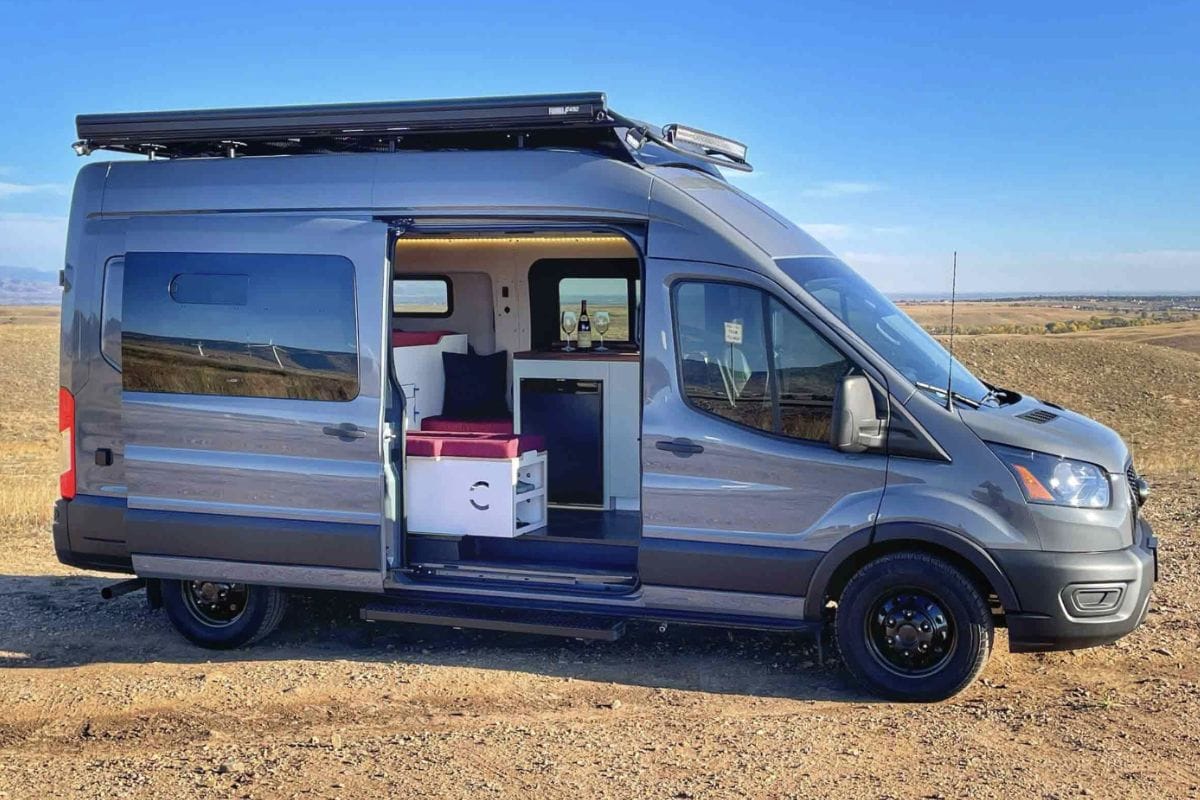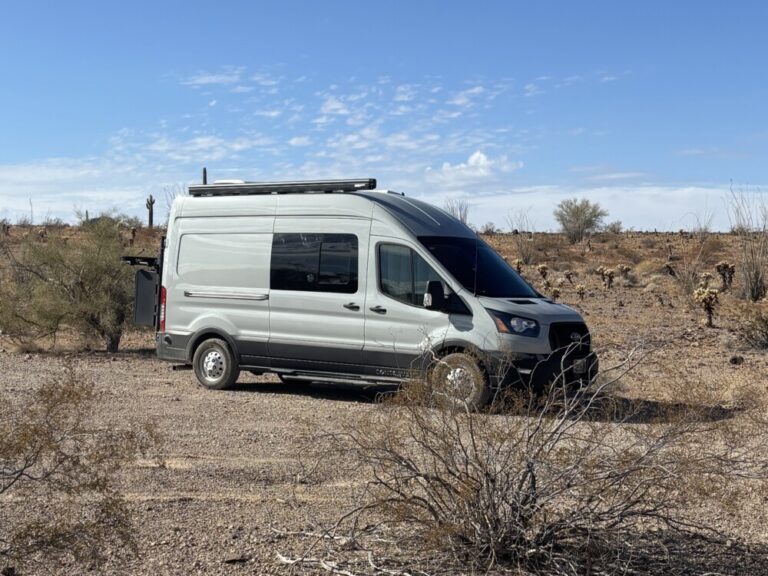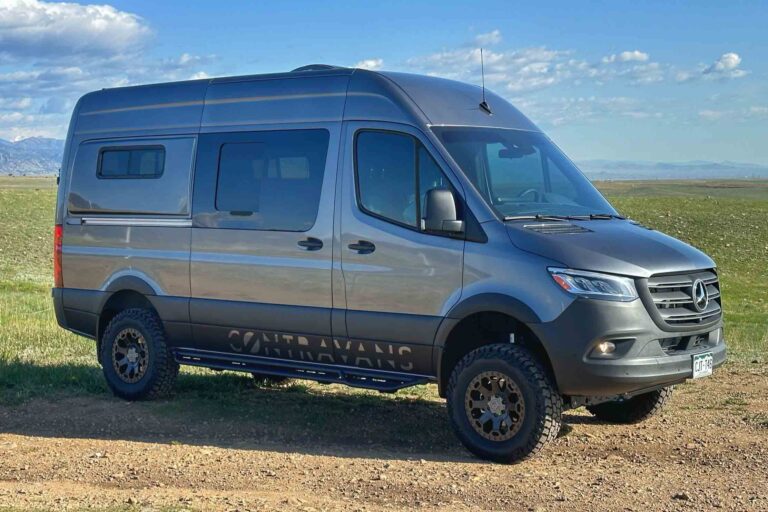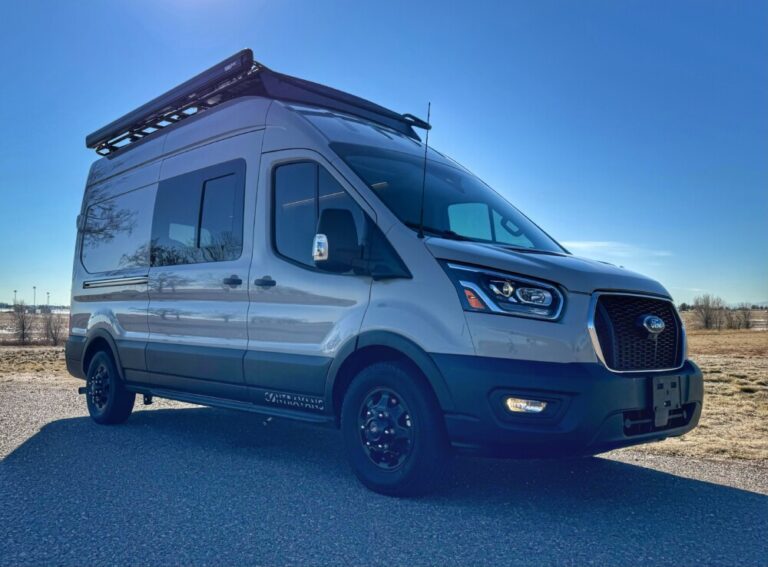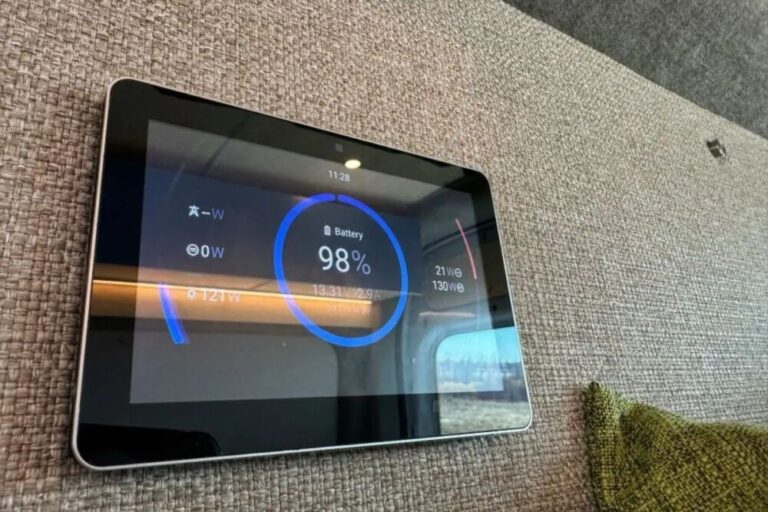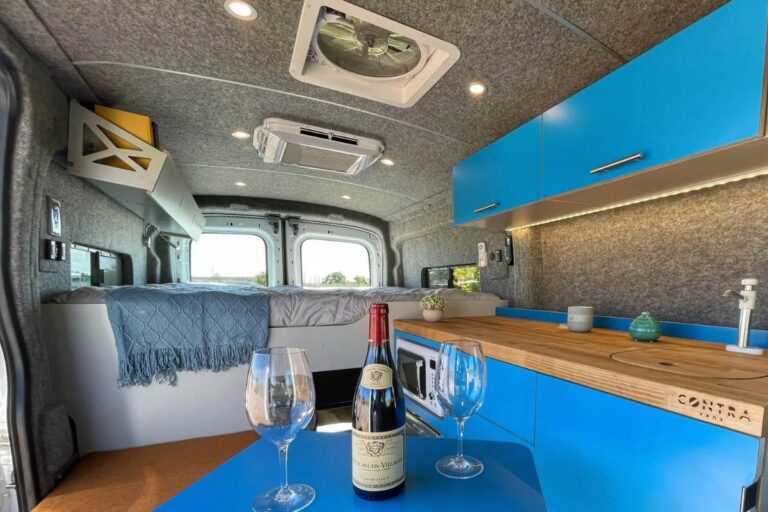What is the Best Van to Convert to a Camper Van? [2024 Guide]
ARE YOU LOOKING FOR THE PERFECT MODEL & BEST VAN TO CONVERT TO A CAMPER VAN?
Welcome to the ultimate guide on the best van to convert to a camper. If you’re dreaming of hitting the road with all the comforts of home, you’re in the right place.
Converting a van into a camper has become a popular trend for adventurers, digital nomads, and families alike. This comprehensive guide will walk you through everything you need to know to find the perfect van for your camper conversion dreams.
What You Need To Consider Before Exploring Van Options
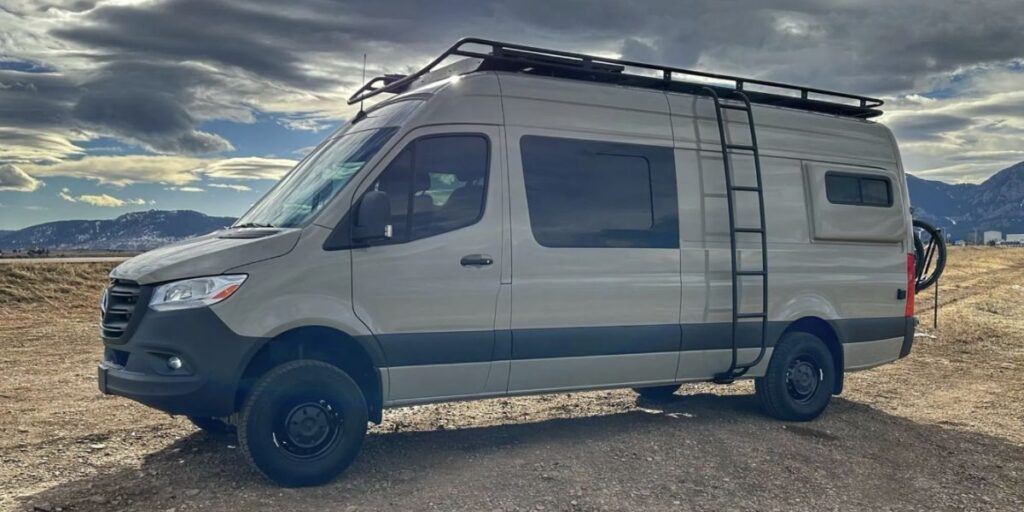
Before searching for the best van to convert to camper, it’s crucial to understand what factors to consider. This section lays the groundwork for making an informed decision on the best van to convert to a camper.
Whether you’re a weekend warrior or planning a full-time nomadic lifestyle, these key considerations will guide you in selecting a van that not only meets your dreams but also fits practically into your life.
So, let’s explore what you need to keep in mind to find the best van for your camper conversion adventure.
Budget
Your budget is the cornerstone of your camper van project. It determines not just the type of van you can afford, but also the extent of the conversion and whether you go with a professional conversion vs DIY.
A higher budget of $50,000+ opens doors to newer models with advanced features, whereas a tighter budget of under $20,000 will direct you towards older models with the potential for creative DIY conversions.
Remember to allocate funds not just for the purchase, but also for the conversion process, ongoing maintenance, and any unexpected expenses.
Mileage on the Van
Mileage is a crucial indicator of a van’s lifespan and potential future expenses when looking for the best van to convert to camper. Lower mileage, under 50,000 miles, often means a higher upfront cost but can lead to fewer mechanical issues down the road.
Higher mileage vans, over 100,000 miles, while cheaper, may require more frequent repairs and maintenance. Balancing the mileage with your budget and needs is key in finding the best van to convert to a camper.
Vans like the Mercedes Sprinter and Ford Transit, known for their durability, can handle higher mileage better than others. Older models like the Ford Econoline hold up well, but are hard to find with under 100,000 miles. High miles might show more wear and tear, leading to more maintenance costs.
Reliability and Maintenance
For reliability, Mercedes Sprinters are highly regarded. Although they can be pricey to maintain, they do have extra comfort features. Ford Transits are also known for their reliability, with more affordable maintenance costs.
Ram Promasters, while generally reliable, have had some transmission issues in older models, which is important to consider when looking at higher mileage vans.
It’s also important to note that DIY maintenance is more feasible with some models than others. Vans like the Ford Transit and Nissan NV are known for their simpler mechanics, which can be more accessible for owners who wish to undertake their own basic maintenance and repairs. In contrast, vans with more complex systems, like the Mercedes Sprinter, often require professional servicing to maintain their reliability and efficiency over time.
Van Size
In terms of size, the Ford Transit line offers the largest range of sizes, offering both low, medium, and high roof options with several wheelbases as well. Mercedes offers the largest van in the 170″ Sprinter High Roof Extended. Ram rounds out the lineup of modern cargo vans with the Ram Promaster line which now has a Super High Roof version with the most interior height of any van on the market.
The Ford Econoline (discontinued after 2014) and Chevy Express are only available in low roof versions. However, as you can see in many examples in our gallery, folks often opt to install a pop top or fiberglass topper to increase the headroom and storage space in these vans. 4×4 conversion kits are also a popular upgrade.
On the smaller end, the Ford Transit Connect, Nissan NV200, and Ram Promaster City are compact and efficient. They are ideal for solo travelers or couples who want an affordable weekend getaway vehicle. Small vans cheaper price tag, provide ease of driving and parking, but have limited interior space for the conversion.
When choosing the right van for you, consider how you plan to use the van 80% of the time, the number of people and pets traveling with you, the climates you will encounter, and the terrain where you intend to take it.
Fuel Efficiency
For fuel efficiency, smaller vans like the Ford Transit Connect and Ram Promaster City are excellent choices. They offer fuel mileage in the mid to high twenties per gallon compared to larger vans which can be as low as 10mpg, depending upon the size, weight, and drivetrain of the van. For larger vans, the Mercedes Sprinter, especially the newer models, get up to 18mpg of fuel economy due to the efficient turbo diesel engine.
Fuel efficiency is a significant ongoing cost factor, especially for those planning extensive travel. Don’t overlook this when searching for the best van to convert to camper. More fuel-efficient vans can save you a considerable amount of money over time. However, they often come with a trade-off in terms of size and power.
Weigh the importance of fuel efficiency against your space and travel needs before purchasing a van.
Resale Value
Mercedes Sprinters often hold their value best, especially with a high-quality conversion. Ford Transits also maintain good resale value, particularly the newer models with all-wheel-drive and the Ecoboost engine.
The resale value is an important consideration, especially if you plan to sell or upgrade the van in the future. A well-maintained van and a high-quality conversion can significantly enhance the resale value, making it an important factor in your initial selection.
DIY vs Professional Conversion
Decide whether to undertake the conversion yourself or hire professionals. A DIY conversion is more budget-friendly and allows for personalized customization. However, it requires time, skill, effort, tools, and space to complete the conversion. Professional conversions, while more expensive, offer expertise, efficiency, and often higher quality results.
Your choice will depend on your budget, skills, and how much time you’re willing to invest. Keep in mind, professional conversions in these larger vans can significantly enhance their functionality and appeal, potentially increasing their resale value.
If you’re unsure about which direction to take, check out this post to help you decide, DIY vs. Professional Campervan Conversion: Which is Right for You?
The Best Models of Vans to Convert to a Camper Van
In this section, we delve into some of the most popular van models that have proven to be the best. Each model comes with its unique set of features and pros and cons which cater to different needs and preferences.
Small Van Models
Nissan NV200
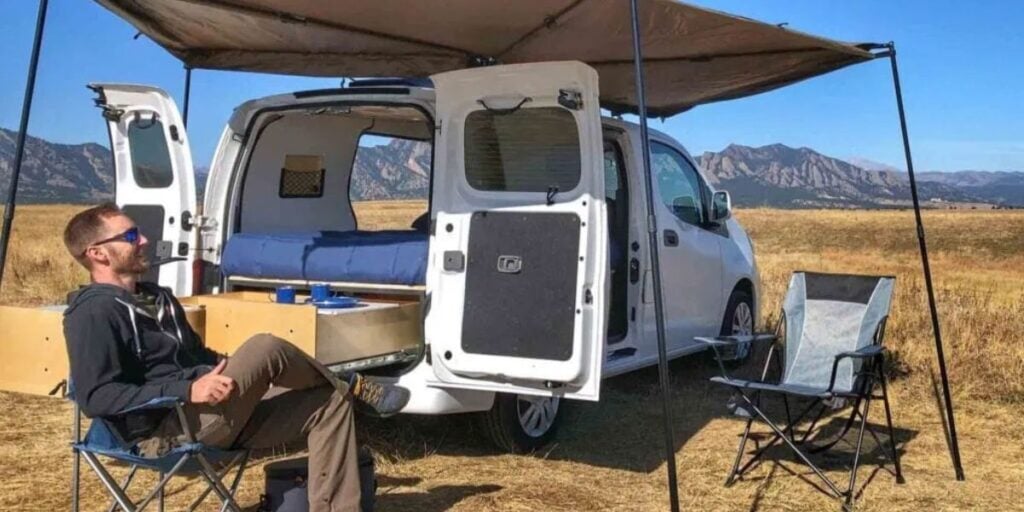
The Nissan NV200 model is a compact van that offers an excellent foundation for camper conversions, especially for individuals. It strikes a balance between being small enough for ease of driving and parking, while still providing sufficient space for essential camper amenities. The larger NV Cargo models offer more room, making them suitable for more extensive conversions, including full-sized beds, kitchenettes, and seating areas.
Pros:
- Versatility: The NV comes in various sizes, catering to different conversion needs – from minimalistic designs in the NV200 to more spacious setups in the NV Cargo.
- Affordability: It’s one of the more budget-friendly options on the market, making it an excellent choice for those starting their camper van journey.
- Maneuverability: Especially the NV200 model, is easy to drive and navigate in urban environments, similar to a regular car.
- Efficient Space Usage: Despite its compact size, the NV series is designed to maximize interior space, allowing for clever and efficient conversion layouts.
Cons:
- Limited Space in NV200: The smaller NV200 model may not be suitable for those looking for a larger living area or planning to travel with more people.
- Basic Interior: Compared to more premium models like the Mercedes Sprinter, the Nissan NV’s interior is relatively basic and might require more extensive work to create a comfortable living space.
- Lower Towing Capacity: Particularly in the NV200, the towing capacity is limited, which could be a concern for those looking to haul additional gear or trailers.
Ford Transit Connect
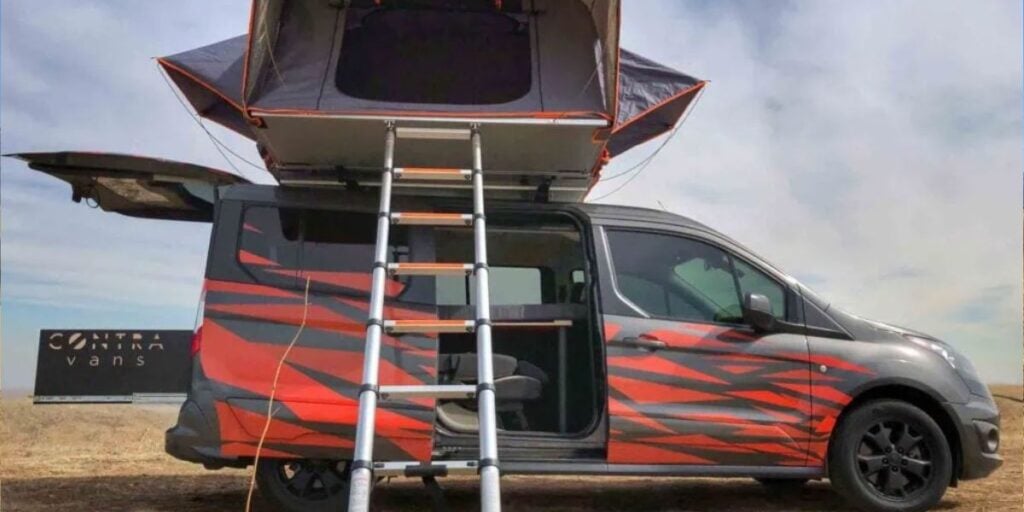
The Ford Transit Connect is a compact and versatile van, ideal for those seeking a smaller footprint for their camper conversion. Its smaller size makes it a perfect choice for solo travelers or couples and is particularly appealing for those who plan to navigate urban environments or tight camping spots. Despite its compact exterior, the Transit Connect offers a surprisingly roomy interior, allowing for creative and efficient use of space. Check out this Ford Transit Connect that we converted to fit a family of 5.
Pros:
- Fuel Efficiency: One of its standout features is its excellent fuel economy (25-28mpg), which makes it ideal for long road trips without the worry of frequent fuel stops.
- Customization Potential: The Transit Connect is known for being highly adaptable, with numerous conversion possibilities that can be tailored to individual needs and preferences.
- Ease of Driving: Its size and car-like handling make it easy to drive and park, especially in crowded cities or narrow roads.
- Affordability: Compared to larger vans, the Transit Connect is more budget-friendly, both in terms of initial purchase price and ongoing maintenance costs.
Cons:
- Limited Space: While its compact size is an advantage in some scenarios, it also means limited living and storage space, which could be a constraint for more extensive conversion features or for those traveling with more gear.
- Performance Under Load: The smaller 2.0L engine may struggle with heavier loads, so it’s essential to consider the total weight after conversion.
- Off-road Capability: It is not designed for heavy off-road use, so if your travel plans include rugged terrain, this might not be the most suitable option.
Ram Promaster City
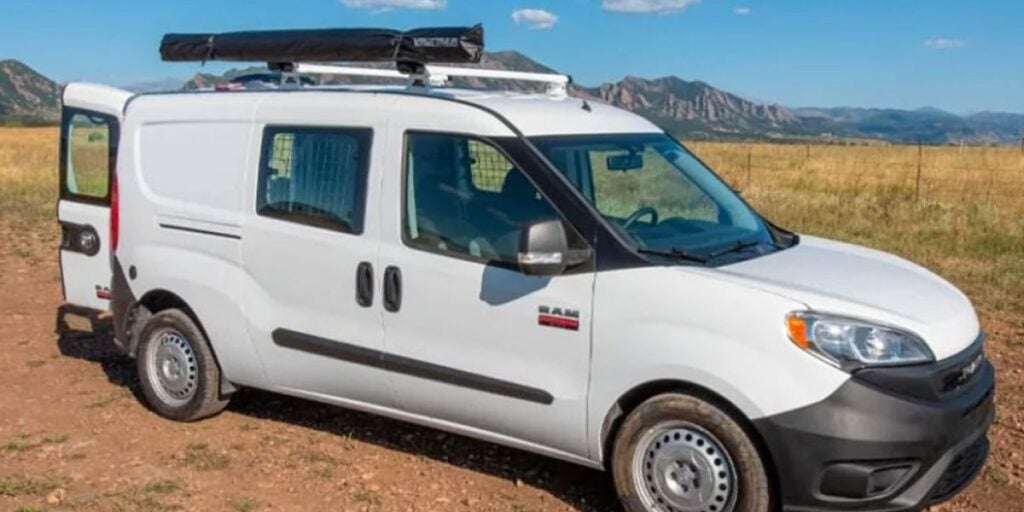
The Ram Promaster City is a compact van that stands out for its efficient space and practicality, making it a popular choice for those looking to convert a van into a camper on a smaller scale. Its design is focused on maximizing the interior space within a relatively small footprint, offering a comfortable and functional living area for solo travelers or couples.
Pros:
- Space Efficiency: Despite its compact size, the Promaster City is designed to optimize every inch of space, providing ample room for essential living amenities in a camper conversion.
- Fuel Economy: It boasts excellent 28mpg fuel efficiency, which is a significant advantage for long-distance travel, keeping running costs lower.
- Lower Maintenance Costs: Compared to larger vans, the Promaster City generally incurs lower maintenance and repair costs.
- Urban Maneuverability: Its size allows for easy maneuvering and parking in urban settings, making it an ideal van for city dwellers or those who frequently travel to densely populated areas.
Cons:
- Interior Height Limitations: The van’s limited interior height can be a drawback for those who prefer standing room inside their camper.
- Limited Towing Capacity: It’s not designed for heavy towing, so if you plan to pull a trailer or have heavy gear, this might not be the best option.
- Space Constraints for Extensive Conversions: While efficient, the space might still feel cramped for more ambitious conversion plans or for those desiring a wide range of amenities within their camper.
Large Van Models
Mercedes Sprinter
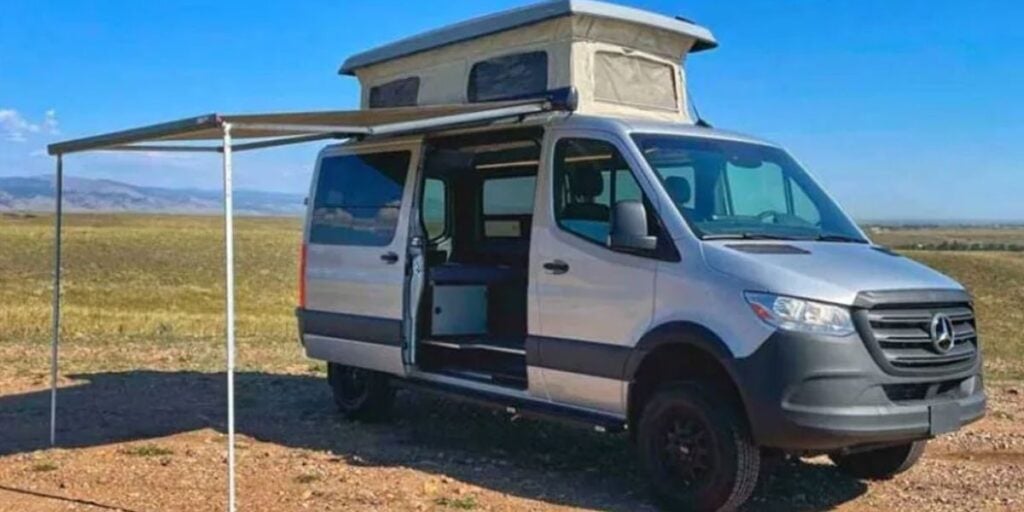
The Mercedes Sprinter is a large van renowned for its quality, durability, and spacious interior, making it high on the ‘best van to convert to camper’ list. Available in multiple configurations, including different roof heights and lengths, it caters to a wide range of needs, from minimalist designs to luxury mobile homes. The high-roof models are particularly popular, offering enough interior height (6’3″) for most people to stand up comfortably, a significant advantage for full-time van life. Check out a detailed Transit vs Sprinter Comparison here.
Pros:
- Spacious Interior: The Sprinter’s generous interior dimensions allow for creative and comfortable layouts, with ample room for amenities like full-sized beds, kitchens, and even bathrooms.
- High Roof Options: The availability of high-roof models eliminates the need for a pop top roof, providing sufficient standing room and a more open, airy feel inside.
- Robust Build and Engine Performance: Known for its reliable performance and durability, the Sprinter can handle long distances and varied terrain, making it ideal for extended travel.
- Resale Value: Mercedes Sprinters often hold their value well, especially those that have been professionally converted into campers.
Cons:
- Higher Purchase and Maintenance Costs: The Sprinter is on the higher end in terms of initial cost, and maintenance can be more expensive due to premium parts and the need for specialized service.
- Size for Parking and Maneuvering: Its larger size can make parking and driving in tight spaces more challenging, especially in urban environments.
- Fuel Efficiency: While it offers good mileage for its size, it’s still less fuel-efficient compared to smaller vans, which might be a consideration for those conscious about fuel costs.
Ford Transit
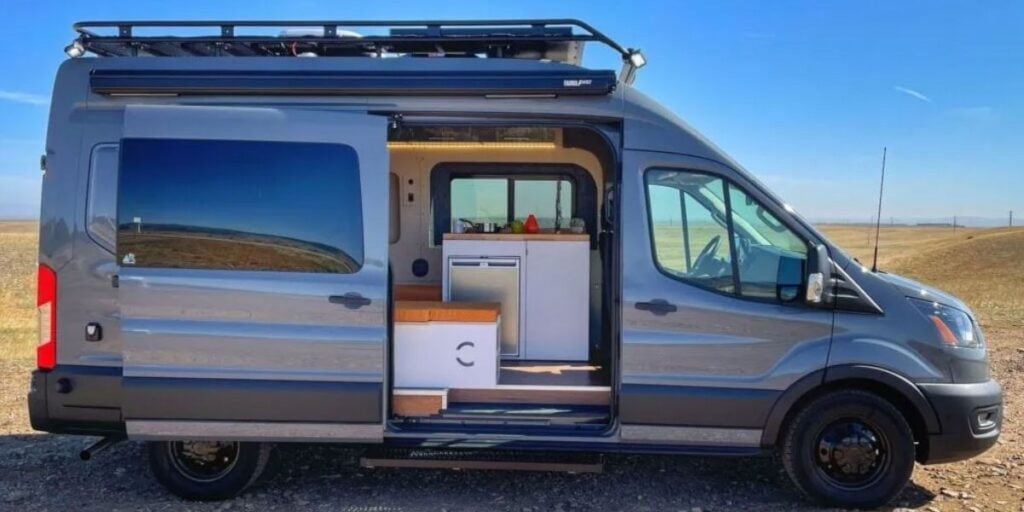
The Ford Transit is a highly versatile and reliable van, making it high on the ‘best van to convert to camper’ list. It comes in various sizes and configurations, including different roof heights and lengths, providing options for both compact and spacious builds. The Transit’s popularity is partly due to its widespread availability, ease of maintenance, and the comfort it offers for both driving and living. Check out 9 of our Ford Transit van conversions & the prices.
Pros:
- Size Variability: With multiple size options available, you can choose a model that perfectly fits your needs, whether it’s a more compact van for easier maneuverability or a larger one for more living space.
- Reliable Performance: Known for its robust and reliable performance, the Ford Transit is a dependable choice for both short and long-term travels.
- Driving Comfort: The Transit is designed with a focus on driver comfort, offering a smooth ride and easy handling, even in the larger models.
- Customization Potential: Its straightforward design and widespread popularity mean there’s a wealth of customization options available, both for DIY enthusiasts and professional conversions.
Cons:
- Fuel Efficiency: While it offers decent fuel efficiency for its size, it’s still a larger vehicle, so fuel costs will be higher compared to other vans, especially in the AWD models.
- Maneuverability in Tight Spaces: The extended length van has a good turning radius, but the longer rear end means that you’ll have to exercise caution when maneuvering in narrow or crowded environments, like city streets, parking lots, or packed campsites.
Ram Promaster
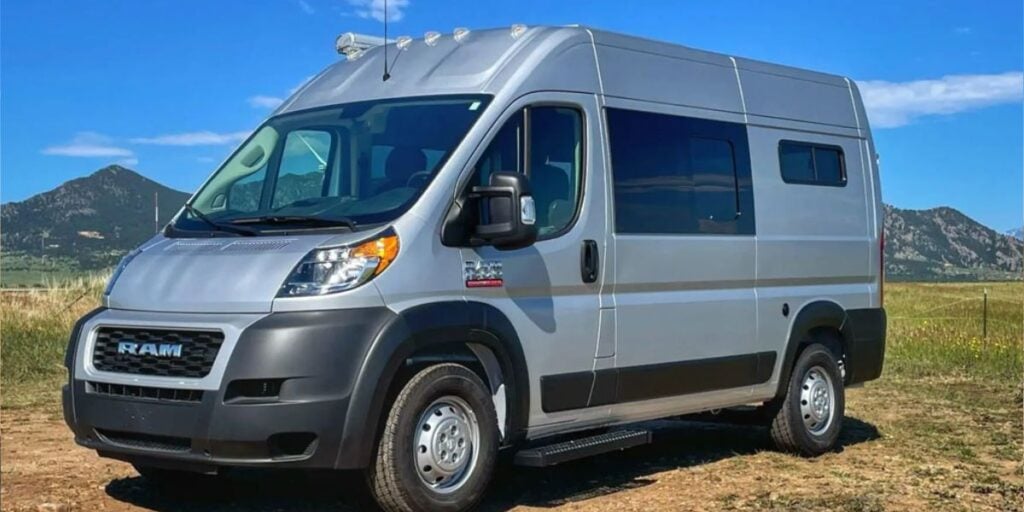
The Ram Promaster is a full-size van favored for camper conversions due to its wide body and front-wheel-drive configuration. It stands out for its spacious interior, which is highly conducive to creating roomy and comfortable living spaces. The Promaster’s square-shaped design maximizes the usable interior space, making it an excellent choice for more extensive and luxurious camper builds. Check out a detailed Promaster vs Transit Comparison here.
Pros:
- Ample Interior Space: The wide body design of the Promaster allows for a spacious interior, offering more room for amenities and storage, making it ideal for longer trips or full-time van life.
- Front-Wheel Drive: This feature provides better traction in poor weather conditions and contributes to a lower floor height, making entry and exit easier and expanding the interior vertical space.
- Versatility in Conversion: Its boxy shape and ample space make it a popular choice for both DIY enthusiasts and professional converters, as it accommodates a wide range of design options.
- Good Value for Size: Compared to other large vans like the Mercedes Sprinter, the Ram Promaster comes at a more affordable price point, offering good value for its size.
Cons:
- Aftermarket Accessories: The design and drivetrain of the Promaster lend it to having fewer suspension upgrades, wheel and tire options, and other accessories that are available for the Transit or Sprinter.
- Reliability Concerns: Some older models have faced reliability issues, particularly with the transmission , so it’s important to research and potentially opt for newer models or well-maintained used ones.
- Driving Dynamics: Due to its size and front-wheel-drive configuration, the driving experience can be different from rear-wheel or all-wheel drive vans, which might require some adjustment for new drivers.
Chevy Express
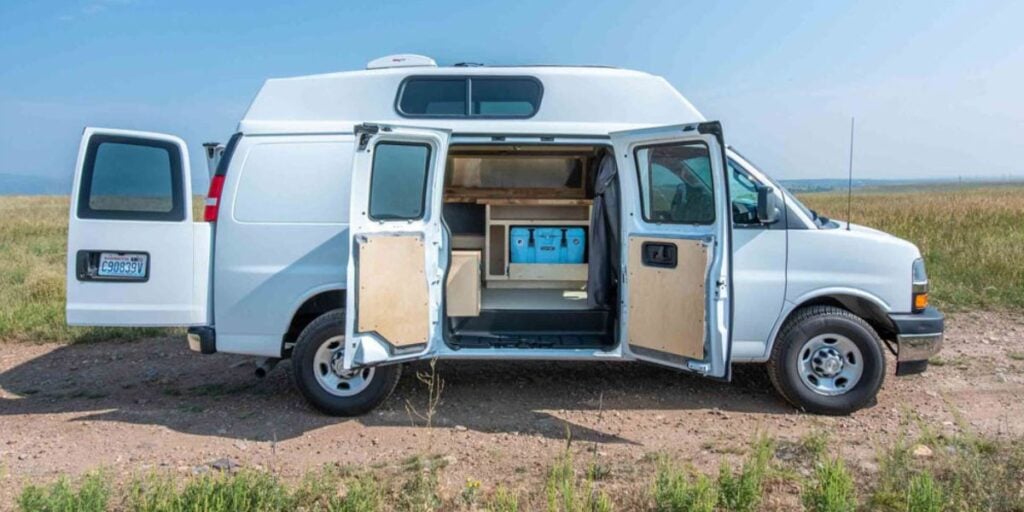
The Chevy Express is a full-size van that has been a staple in the American market for years, known for its durability and straightforward design. It’s a popular choice for camper conversions, especially among those who prefer a more classic van feel or are looking for a vehicle that’s easy to work on and modify. The Express offers a robust platform for various conversion types, from basic fit-outs to more elaborate, comfortable setups.
Pros:
- Powerful Engine Options: The Chevy Express often comes with strong V8 engines, providing ample power for towing and handling heavier conversion builds.
- Durability and Longevity: This van is known for its long-term reliability and solid construction, making it a dependable choice for long-term use.
- Simplicity in Design: The straightforward and time tested nature of its design and mechanics that are common across Chevy truck platforms make for easier maintenance and repair.
- Ample Space for Conversions: Its size and traditional van layout provide plenty of room for a comfortable living space, including full-size beds, kitchens, and storage.
Cons:
- Fuel Efficiency: The Express, particularly with V8 engines, is less fuel-efficient compared to newer or smaller van models, which might be a concern for those with fuel cost considerations.
- Aged Design: While its classic design has a certain appeal, it lacks some of the modern features and refinements found in newer vans like the Mercedes Sprinter or Ford Transit.
- Limited Factory High-Roof Options: Unlike some of its competitors, the Chevy Express doesn’t offer factory high-roof models, which can be a limitation for those who prioritize standing room in their camper conversion.
Table: Comparing NEW Van Models
| Van Model | Avg. Cost (new) | Mileage (avg mpg) | Engine Life | Resale Value |
|---|---|---|---|---|
| Nissan NV200 | $22,890 | 22-26 | 300,000 | Low |
| Ford Transit Connect | $34,100 | 25-28 | 300,000 | High |
| Ram Promaster City | $29,915 | 26-30 | 300,000 | Medium |
| Mercedes Sprinter | $63,093 | 17-18 | 350,000 | High |
| Ford Transit | $54,455 | 13-16 | 300,00 | Medium |
| Ram Promaster | $49,615 | 14-18 | 250,00 | Low |
| Chevy Express | $47,300 | 13-15 | 250,000 | Medium |
Keep in mind there are different models for each van but this table is great to give you a rough idea to compare the newer models. When looking for a secondhand van, be sure to do plenty of research before purchasing. Condition is key when buying a used van.
How Much Does The Conversion Cost?
Embarking on a camper van conversion journey is an exciting process, but it’s crucial to understand the costs involved when considering the best van to convert to camper. Conversion costs can vary widely based on factors like the size of the van, the complexity of the conversion, the quality of materials used, and whether you opt for a DIY project or a professional conversion.
It’s important to set a realistic budget that aligns with your expectations and needs. For a more detailed breakdown of what you can expect to pay for a professional van conversion, visit Contravans’ blog post for comprehensive information and guidance.
Professional Conversion
Professional conversions can cater to a wide range of budgets and preferences. For small basic vans, a professional conversion can start as low as $7,500. This price typically covers the essentials, offering a simple yet functional living space.
On the other hand, conversions of larger vans with luxurious finishes, custom designs, and advanced features can exceed $100,000 USD. The cost varies based on factors like the van size, the level of customization, and the inclusion of high-end amenities like full bathrooms, advanced electrical systems, air conditioning, and bespoke interiors.
Get a free conversion quote for Contravans here, a highly-rated van conversation company.
DIY Conversion
DIY conversions offer a more budget-friendly alternative. Costs largely depend on how much work you’re willing to do yourself and the materials you choose. A basic DIY conversion can start as low as $5,000 to $10,000, covering basic necessities using budget materials and simple designs.
More advanced DIY projects with higher-end finishes and more complex systems can range from $15,000 to $25,000. Remember, while DIY can save money, it requires a significant time investment and some level of skill in areas like carpentry, electrical work, and plumbing.
Legal & Insurance Requirements to Convert a Camper Van
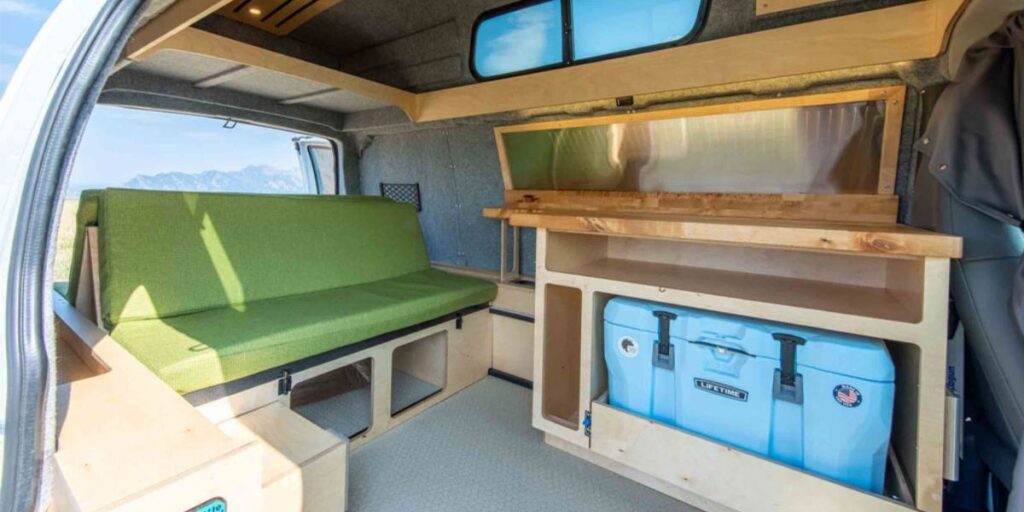
When converting a van into a camper, it’s not just about the design and build; you also need to navigate the legal and insurance aspects to ensure everything is above board. This process can vary significantly depending on your location, but there are general guidelines and requirements that are commonly applicable.
Legal Requirements
- Vehicle Classification: Once you convert a van into a camper, its classification can change. This can affect how it’s registered with your local motor vehicle department. You might need to re-register it as a motorhome or RV, depending upon your state’s requirements.
- Safety Standards: Your conversion must meet certain safety standards. This includes the proper installation of gas, electrical, and plumbing systems, if applicable. Seat belts and sleeping areas should also comply with safety regulations.
- Emissions and Inspection: Converted campers often need to pass emissions tests and vehicle inspections. Ensure your vehicle complies with the environmental standards and road safety regulations in your area.
- Permits and Documentation: Depending on where you live, you may need specific permits for the conversion process, especially if it involves significant structural changes to the vehicle.
Insurance Requirements
- Insurance Type: Once a van is converted into a camper, standard van insurance might not be sufficient. You’ll likely need to switch to motorhome or RV insurance, which can offer coverage more tailored to your needs as a camper owner.
- Disclosure of Modifications: It’s crucial to inform your insurance provider about all the modifications made during the conversion. Undisclosed modifications can lead to insurance claims being denied.
- Valuation: Insurance companies may require an appraisal of the van post-conversion to determine its value. This is especially important if you’ve made significant investments in the conversion and want to cover them in the case of a full loss incident.
- Additional Coverage: Consider additional insurance coverage for personal belongings inside the camper, especially if you plan to live in or travel extensively with it.
Check out more information on insurance here – Campervan Insurance: Your Top 9 Questions Answered
Used Converted Campervans For Sale
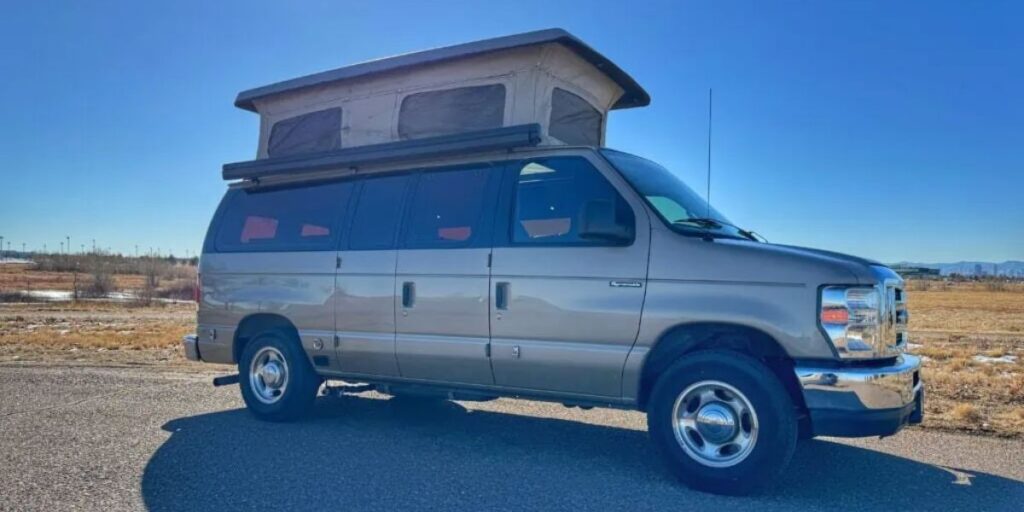
Buying a used converted campervan can be a smart choice for those eager to explore van life without the time and expense of a new conversion. These pre-loved vans often come equipped with essential amenities and can be more budget-friendly. However, it’s crucial to evaluate the van’s condition, the quality of the conversion, and how well it aligns with your needs.
For a selection of used converted campervans, visit Contravans Vans For Sale to explore various options that might suit your van life dreams.
Tips for Finding Your Used Van
FAQs: Best Van to Convert to Camper
What is the cheapest van for a camper conversion?
Older models like the Chevy Express or Ford E-Series are often the most affordable options for camper conversions. They may have higher mileage but are known for their robustness and ease of conversion. The Nissan NV200 is also a budget-friendly choice, especially for smaller conversions. Solo travelers often find this the best van to convert to a camper.
What is the best van to convert for a family of 4?
The Mercedes Sprinter, Ford Transit or Ram Promaster are excellent choices for family conversions. Their size and versatility make them ideal, offering various roof heights and lengths to accommodate sleeping areas, a kitchen, and ample storage for a family of four.
What is the most reliable van for camper conversion?
The Mercedes Sprinter and Ford Transit again rank highly for reliability. These vans are known for their longevity and robust performance, making them popular choices for both DIY and professional conversions.
What are the best older vans for conversion?
Older vans like the Ford E-Series and Chevy Express have a proven track record for durability and ease of conversion. These models offer a lot of space and are well-suited for a variety of build-outs, making them a popular choice among van life enthusiasts.
How much does it cost to convert a van into a camper?
The cost can vary greatly depending on the extent of the conversion and whether you opt for a DIY project or a professional build. A basic DIY conversion can start as low as $5,000, while professional small van conversions can range from $7,500 to over $100,000 for more luxurious and comprehensive builds. For more details about the cost of a professional fit-out, check out our Professional Van Conversion Cost Breakdown post.
Conclusion: Best Van to Convert to Camper
Choosing the best van to convert to a camper is a journey unique to each individual’s needs, budget, and lifestyle. The options are more diverse and exciting than ever, catering to a wide range of preferences and requirements. Whether you opt for the compact and budget-friendly Nissan NV200, the versatile and family-sized Mercedes Sprinter or Ford Transit, or the robust and spacious Ram Promaster, each van offers its own set of advantages for life on the road.
The key to making the best choice lies in carefully considering your specific needs: the size and layout that will make you most comfortable, the reliability and maintenance you’re prepared to handle, and, importantly, the budget you have allocated for both the purchase and the conversion process. Remember, the best van for converting to a camper is one that not only fits your dream of a mobile home but also aligns with the practicalities of your everyday life and travel ambitions.
You might also be interested in:
Winterizing Your Campervan: A How-To Guide
The Best Heaters For Campervans
The Best Rooftop Air Conditioner For Van Life
Ford Transit Lift Kit: A Complete Guide

